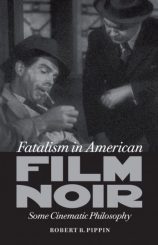Whenever you hear a character in the next film noir you are watching say something that sounds a lot like sarcasm, heavy irony or simply like the words of a doomed man… you may have caught one of the moments Professor Pippin uses to build a whole theory. Build it around the attitude, not the statement, mind you.
 And as a matter of fact, there are actually many situations, conclusions and even proverbs used by male and female characters alike that bring to mind a sense of being lost, powerless and altogether at the mercy of some powerful force that renders any action by the characters useless and ineffectual. And why, yes, fatalism is the word that comes to mind, and it is the general subject of Pippin’s new study of a genre, this time devoting page after page to a philosophical discourse on the mechanisms of powerlessness.
And as a matter of fact, there are actually many situations, conclusions and even proverbs used by male and female characters alike that bring to mind a sense of being lost, powerless and altogether at the mercy of some powerful force that renders any action by the characters useless and ineffectual. And why, yes, fatalism is the word that comes to mind, and it is the general subject of Pippin’s new study of a genre, this time devoting page after page to a philosophical discourse on the mechanisms of powerlessness.
And, after all, Pippin is no layman when it comes to film and genre criticism; his last acclaimed study focused on the western movie. Thus, he can clearly make out many differences that catch the eye if one compares film noir not only to the western movie, but to the majority of films where the urge, devotion and moral integrity seem to be reason enough to have a character strike out and actually “do” something that has the desired consequence and thus leads to a certain course of action.
Now, that isn’t exactly true for the actions of many film noir characters. Just the opposite is the case. No matter what action is taken, what plot is carried out or what odds are overcome; many of these characters actually seem to be on the brink of despair since no action has any effect.
And it did not take long for this observation to become an entire theory in certain circles, since echoes of the absurdist movement and the old question of self-determination vs. fate are clearly audible here.
While going into detail with the masterpieces Scarlet Street, Out of the Past and The Lady from Shanghai Mr. Pippin convincingly draws attention to the many voices here and elsewhere in the mostly black-and-white noir world that speak with fatalism in their words. Since at times it is the concurrency of the two opposing forces that has many characters look and act like maniacs.
The overall result, however, is not simply that life as a film noir character is rather bad and tiresome. In revealing the relation of this information to many age-old problems, enigmas and theories in philosophy, Mr. Pippin states that the doomed and, to the most extent, impotent film noir character only exists since he is a reflection of the non-fictional “real” modern man.
Now this is getting even more interesting; what about “responsibility,” who takes the blame, are these actions morally acceptable and is there such a thing as a “carte blanche” while interacting with people? Here Pippin comes up with a variety of suggestions how to solve questions like that: “… It is largely a practical question and concerns a collectively sustained practice. That is, the question of how to hold each other to account is a largely normative question and has obviously varied a great deal over historical time, sometimes including notions of familial guilt and inherited responsibility and quite varying notions of the relation between intention and responsibility.”
So after all, here is another thesis that may prove the strong ties of reality to the celluloid world where some examples of how not to act are presented; that is, if you believe that whatever you do has no effect on your own life or that of others. Fatalism then, may work only if you believe in it.
Review by Dr. A. Ebert (C) 2013
Robert B. Pippin. Fatalism in American Film Noir: Some Cinematic Philosophy. (Page-Barbour Lectures). University Press of Virginia, 2012, 135 pages.
(This review was previously published on www.jive-talk.com – Musing on JAZZ and Related Topics).
